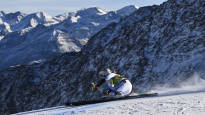Norwegian alpine skier Ragnhild Mowinckel got his name in questionable history on Saturday. Mowinckel became the first athlete to compete in the FIS fluoride test.
FIS introduced a rule for this season that prohibits fluoride creams in all world cup competitions under the federation. The rule was in effect for the first time on Saturday, and Mowinckel was the only one who crashed.
Mowinckel’s case is probably anything but handled, as information from winter sports circles says that the FIS’s fluoride ban monitoring device is far from reliable.
Mowinckel also has the support of his competition partners. Urheilu got hold of a petition drawn up to the FIS management a week ago, in which alpine skiers demanded the postponement of the fluoride ban due to unreliable monitoring.
Three days before the start of the season, FIS announced that it will raise the limit value of a fluoride sample interpreted as positive from 1.0 to 1.8. With the change, FIS wanted to avoid “false positive” test results.
Sports lawyer, deputy referee Olli Rauste knock out the operation of the FIS.
– It does give the impression that the definition of the limit value has not been on a terribly solid basis, says Rauste.
Does Mowinckel complain?
After his dismissal, Mowinckel maintained his innocence.
Urheilu has received information from several sources that the device that monitors the fluoride ban gives positive results for completely fluoride-free skis.
– The prohibited chemical has been left out, but something allowed has been brought in to replace it, which nevertheless gives a positive result. If the device does not understand this, it is incomplete, says Rauste.
FIS announced in 2019 that the fluoride ban will enter into force in the 2020–2021 season. Since then, the union had to postpone the ban’s entry into force three times because it was unable to develop a credible monitoring device. On the way, FIS also changed the developer of the device to another one.
FIS has published only one document on the operation of the current device. Docent working at the University of Jyväskylä Sami Äyrämö is specialized in data analytics. According to Äyrämö, the paper published by FIS does not meet the scientific quality criteria.
These factors favor Ragnhild Mowinckel’s chances of success, if the Norwegian decides to appeal her rejection. Mowinckel can appeal to the FIS disciplinary body, and if he is not satisfied with the decision of the disciplinary body, the decision of the disciplinary body can be challenged in the International Court of Appeal for Sport, CAS.
Rauste has acted as an arbitrator in CAS proceedings. According to him, Mowinckel’s case is directly comparable to one of the most famous doping scandals of the last decade, the center of which was an Estonian skier, two-time Olympic champion and world champion Andrus Veerpalu.
Veerpalu had given a positive doping sample for growth hormone, but the Estonian contested the reliability of the growth hormone test ratified by the World Anti-Doping Agency Wada.
Veerpalu won the case at CAS. Wada was obliged to do more research and change its limit value.
– This (Mowinckel’s case) has a lot of similarities to it.
According to Rauste, FIS’s operation does not stand up to scientific scrutiny.
– If FIS had acted according to the same principles as doping, they should have conducted a study or had it done by an external research institute or scientists. After that, the research should have been made into a scientific article, which should have been peer-reviewed. If this evaluation had accepted the conclusion of the article, the limit value set for the fluoride ban would be valid in principle, says Rauste.
According to Rauste, Mowinckel can basically appeal to CAS only about his rejection. Since FIS is headquartered in Switzerland, claims for monetary compensation are handled by a Swiss lower court.
Rauste estimates that FIS is facing humiliation in the implementation of the fluoride ban.
– The dog is wagging its tail. The association has announced an ambitious goal and said it will do its part to eliminate fluoride. Although it does not seem to be technically successful, the pressure to implement the ban has grown too strong.
– I’m watching with excitement when the FIS admits that maybe the fluoride in ski soles isn’t such a terrible problem for the world that it’s worth ruining the entire skiing sport, says Rauste.
